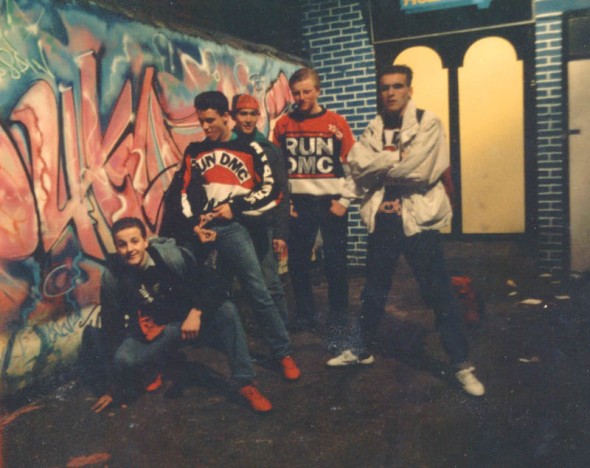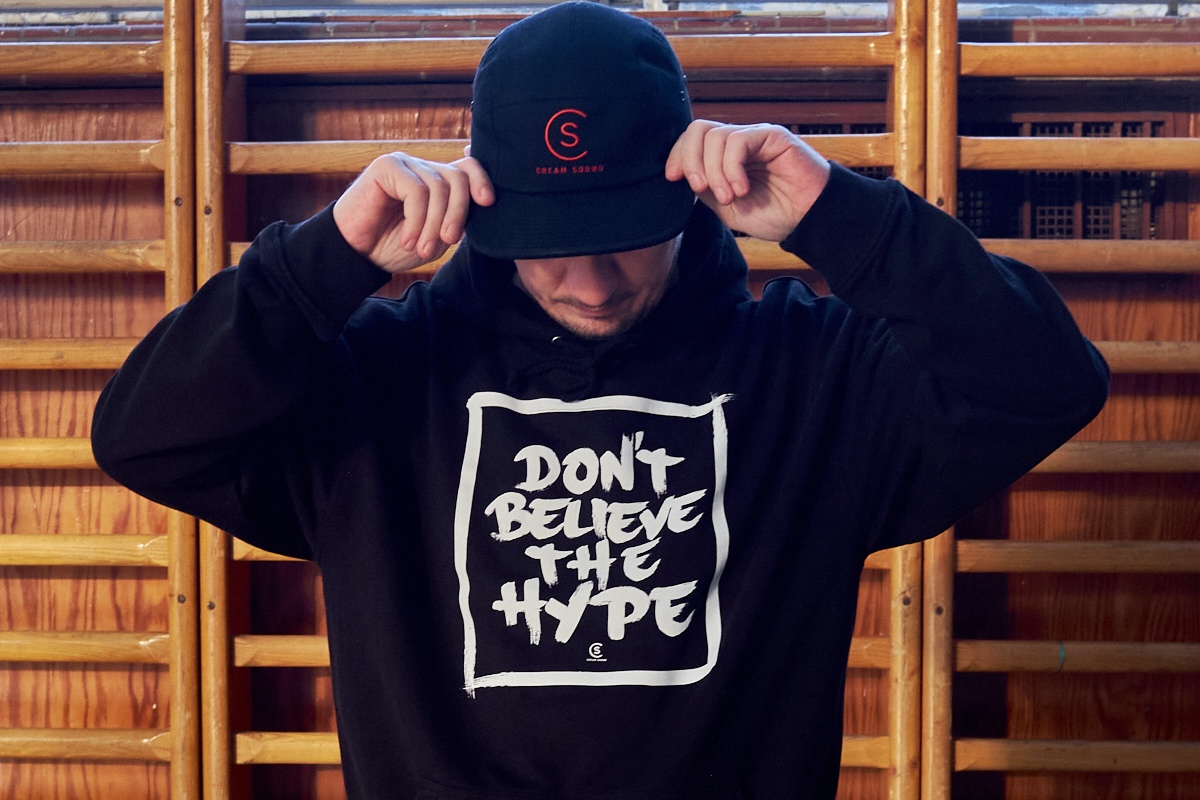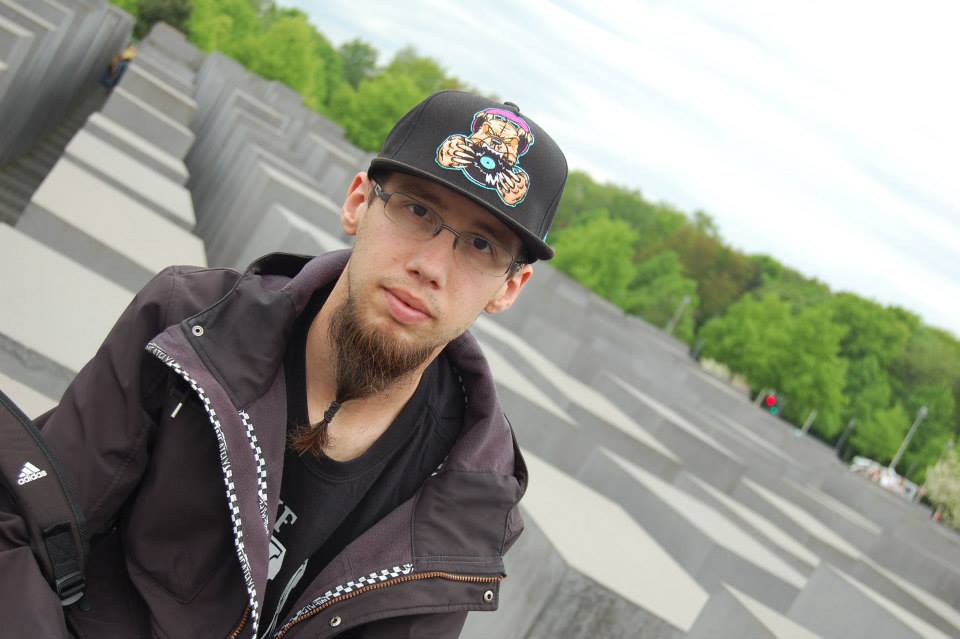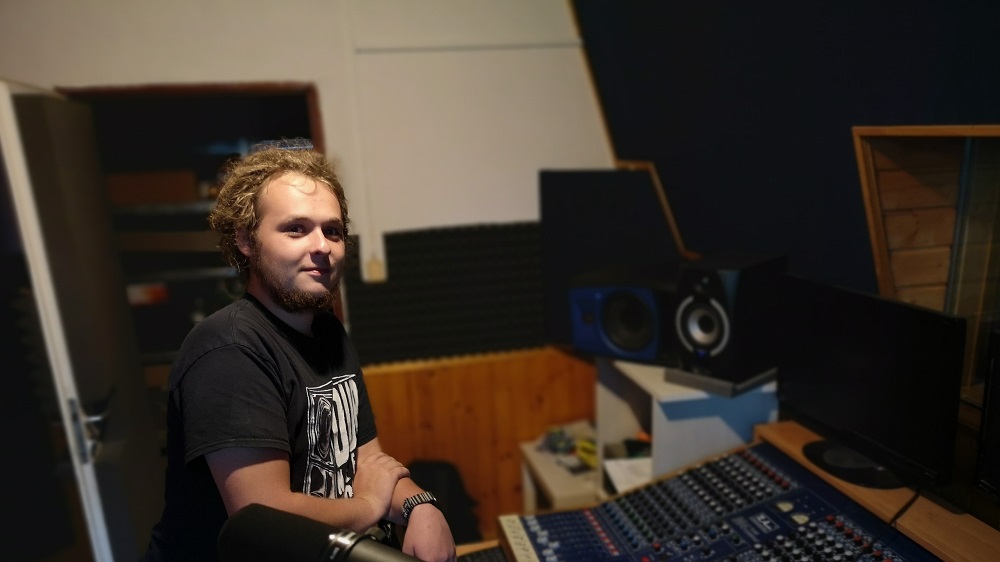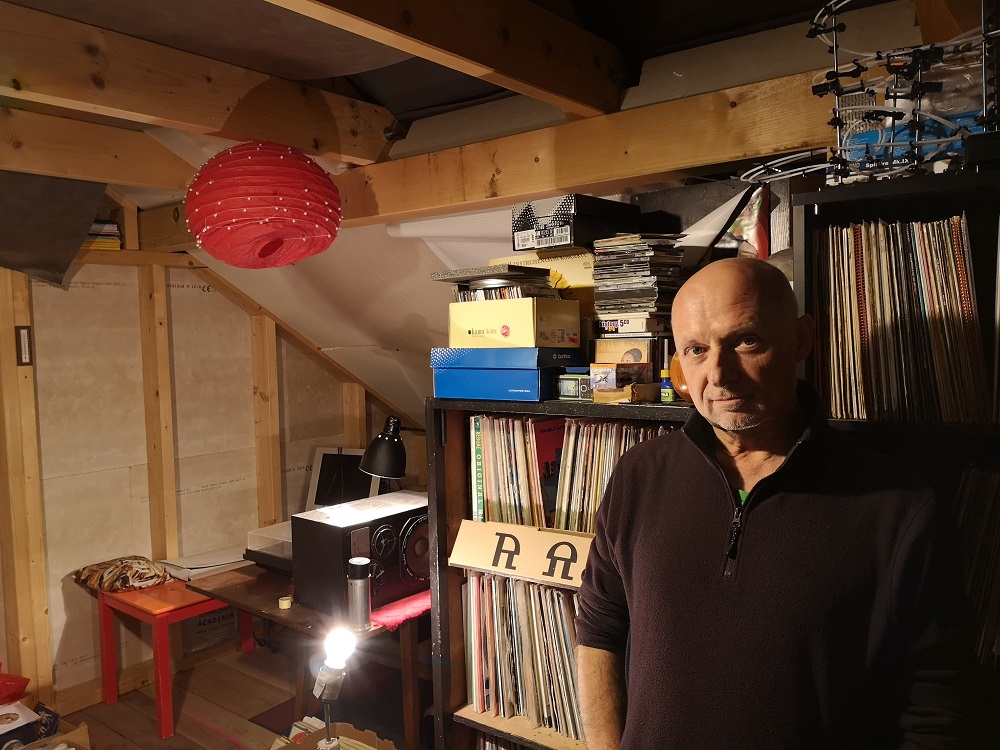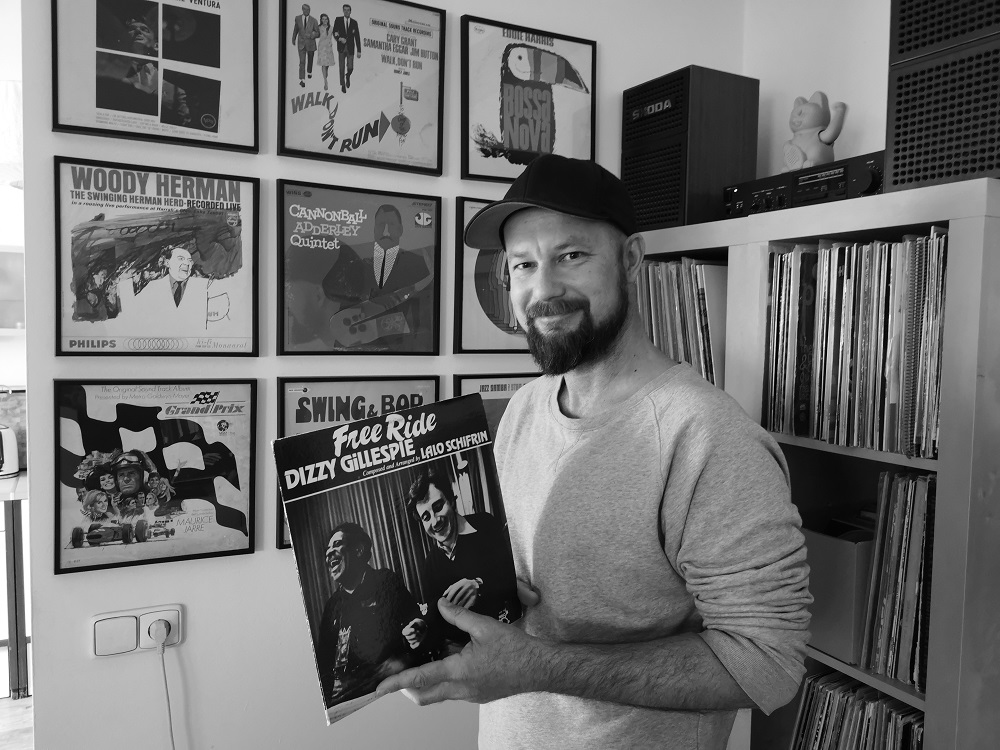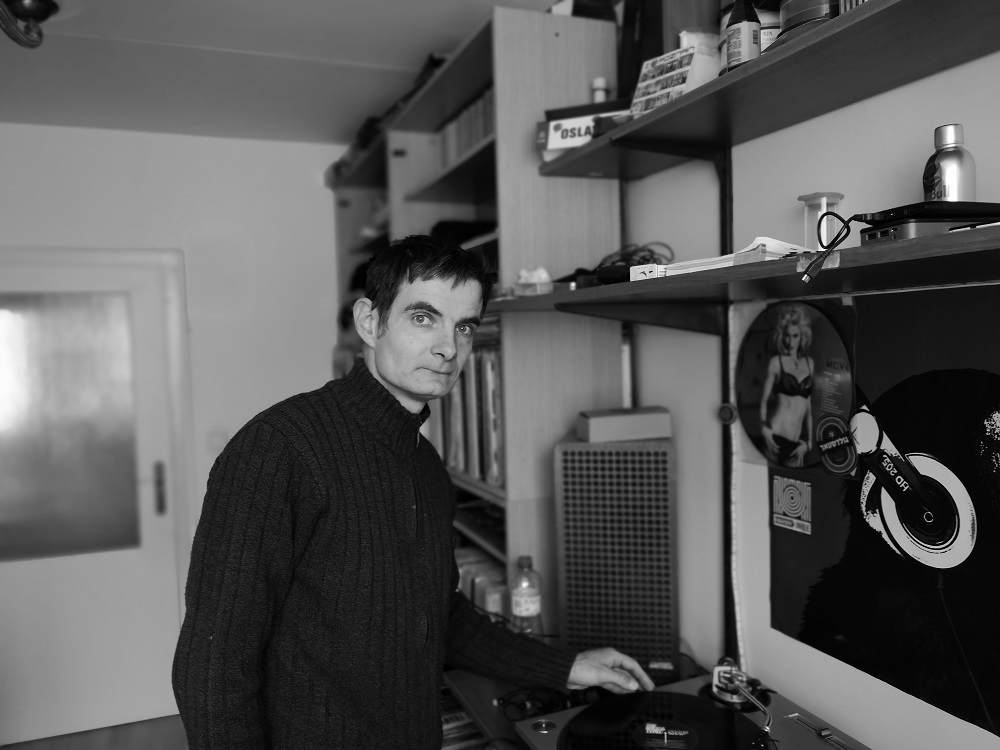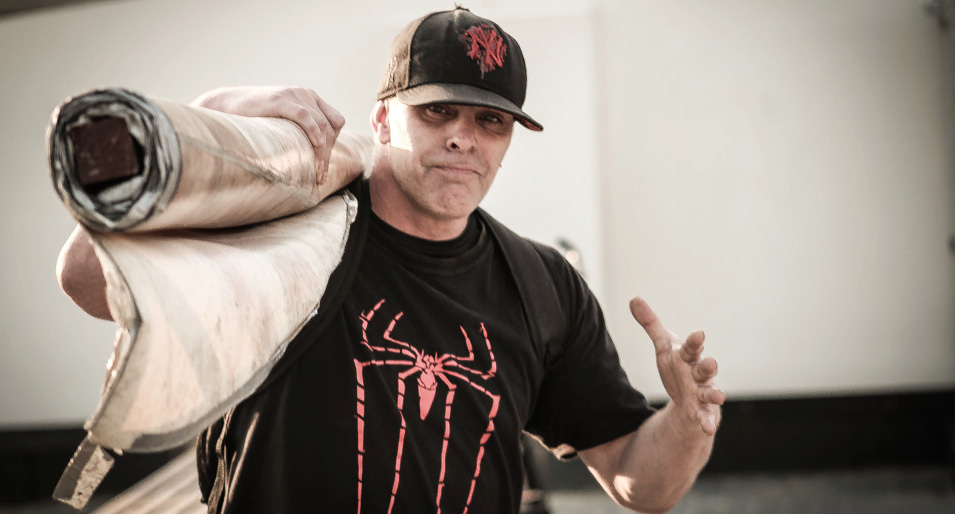
I’d like to start with sum up. You’re beatmaker, DJ and b-boy. But I don’t know if you’ve ever tried emceeing or graffiti.
Back in the days about ’84 I did a bit of graffiti, but I was crap at it man. But you know, when you’re getting into hip hop you want to do it all, you want to become good at it all. I did some graffitti and my mom and my dad they told me off for doing it on the wall in my bedroom. And it was spray paint and it looked terrible really. I wasn’t really good at it man. I had friends who become very good at it back in the days. And I used to go with friends down the track and look out for them and stuff like that.
And what about your and your brother’s beginnings in breakdance?
Well, it was me who actually got my brother into it and he become a monster dancer. But in the beginning before that I was into a lot of things, I was into being a skinhead or a punk and all I was looking was a direction, something to suit with me and one day I was in Bournemouth and come across this guy who was doing a finger pops down at the beach and that’s John. That’s Junk. I kept on going up to him and asking him to do his finger waves and stuff like that and he was very intimidated by me. He thought that if he wouldn’t do his fingerpopping that I was gonna beat him up but I wasn’t. I was really, really interested in what he was doing. So that was really the beginnning of it. Plus watching a programme on BBC 2 called The History Of Hip Hop and I’ve seen all these guys spinning on their backs and the DJ spinning the discs and everything and I was like ‚wow, what the hell is this? this is crazy‘. Anyway, that was sort of like the first bit. Six months later, I had a Puma tracksuit on, short blond hair and it took me a six weeks to get a windmill and backspin and those sort of things and than six months later I went down to a club in Bournemouth called Madison Joe’s. I think it was about late ’84 or ’85. And John couldn’t believe his eyes. He goes ‚is it that punk I’ve seen six months ago?‘. So he said ‚how did you get a windmill like that?‘, because no one could beat my windmill, it was so fast and dynamic.
Speaking about your moves. Which moves you can still perform nowadays?
I’m still doing halos, my windmills, flares, lot of footwork, lot of my own moves, lot of weird little moves I was made up myself. But I am sort of like a trying to get old moves back like backspin to standing up which is what we’re calling pop out. I mean, ain’t really changed that much. I still do the moves even though I’ve got older, it’s a long time, 30 years in b-boying, but I still feel good, because I train. I’m making up new stuff, new bits and pieces. And I can headspin still.
Is there something like regular place or event where you’re dancing nowadays?
Well it’s hard nowadays to find a place where to practice, but there’s a place that John’s got. He’s got his own garage and people go training there. So that’s one place, but after this I think we might got our own place to dance, so we can go three times a week there. It’s been hard in the moment.
What about interest of people nowadays comparing to 80’s and 90’s when you used to be big.
80’s not so much. People used to take a Mickey out of us. While you dance and breakdance is out. But we didn’t really care about that, because we’ve only just begun, but it was about ’87 when everybody in Britain give up. I got into it few years before and then house music come and everybody got into house music. It was ’87 and everybody started taking acid, going to acid house parties, raving and stuff like that, but we didn’t want to do that. We found our own directions. All of us. And it was still in our hearts at that time and we just carried on through the 80’s and 90’s till now. 90’s was better. In Britain, or not just Britain, all over the world people started dancing again and in the 90’s we weren’t really here much. We were more like in Europe, we were still doing competitions in Europe and Battle Of The Year and going to Switzerland, Spain, New York and everywhere. People started up because of us, because we were going to Europe in the 90’s and winning the competitions with a completely different style to Europe. And we were responsible for that, getting that scene going again in the 90’s because we entered the couple of competitions in the 90’s including the UK Champs and we won twice. Now it’s become massive all over the world. You can’t go to any country they don’t know about it.
How was it when you’ve met US crews and their style?
Everybody has different styles. You got European style. At the time the European was more sort of like gymnastical. Lots of flarey moves and flippy moves and stuff like that which we weren’t. We were more combination of fast and stylish. We were responsible for that fast stylish moves and footwork and having that attitude. Americans always have been like that. They always had that sort of style, that mad style.
So you think you’ve affected European scene especially?
Well it wasn’t just Europe, it was America as well, and Australia. People heard of us and there was a video going round of us, that one of the guys from Europe gave to Rocksteady Crew in America and these fuzzy copies of it are all over the world, you know, a copy of a copy of a copy of a copy. Everybody seen our practice session. This was just a practice session and everybody’s gone ‚ooh wow‘, because since New York city breaks or whatever, the first guys who had that real nice style, like Kid Freeze and all those guys, it came from them, more than anything, we seen a lot of stuff of New York and all these guys in America back in the days, we’ve seen a lots of clips, but that was enough. We wanted to be completely different from everybody else.
Your new documentary is about to be released, there’s gonna be premiere of it. How do you feel about the documentary?
It’s a very nice documentary, it’s got feeling. You got lots of b-boys from all around the world and they’re talking about how we come around, giving us props and stuff like that. There’s lots of clips of us doing our stuff. It’s nicely put together, it’s got nice soundtrack and it’s edited beautifully. There’s guy called Charlie Marbles, who’s a friend of us. He spent a lot of time putting it all together and I think everybody’s gonna enjoy it. It’s a proper proper thing. It’s like Freshest Kids, something like that you know.
And what about distribution?
It’s gonna be free download. It’s gonna be given.
Respect.
Yeah, you know, it’s not about money. It’s all about our place in hip hop history. There’s a lot of history, there’s like 30 years of it. It’s never really been about money. It’s all about love, passion and just havin that place in history. Not just speaking for myself, but everybody in the crew have earned it. Every individual have earned that right to have that place, because everybody have done their bit and they are still doing their bits in history of it.
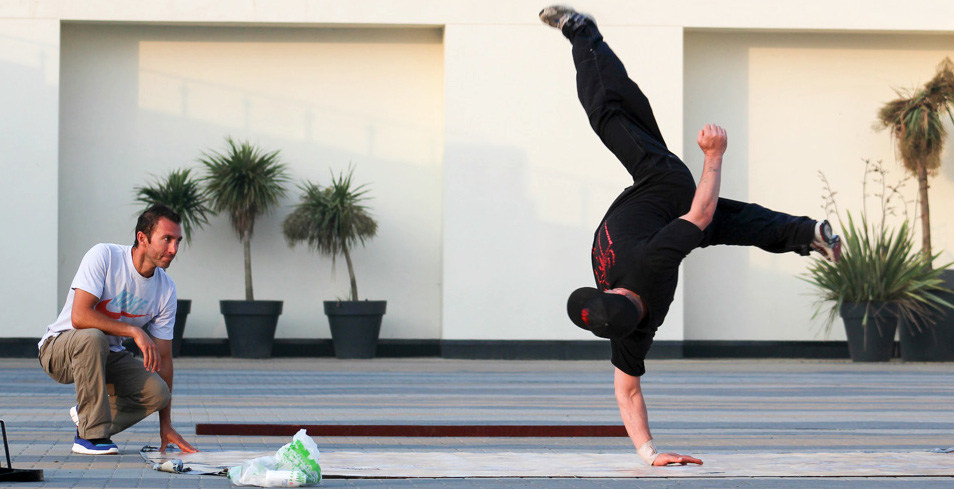
So impact of hip hop on your life was essential?
I never really stuck into many things in my life. You got these phases you’re going through. ‚Yeah it’s good man and 5 weeks later, naaah‘. But with hip hop there’s so much to do, all the elements and stuff. You got djing, you got diggin, looking for samples, producing, graffiti, dance. It keeps you interested. And I’ve been interested for 30 years. I’ve never really stuck to anything except for this.
How and when did you started with djing, diggin and beatmaking?
Well, I was into dance for a bit longer and when you’re dancing to music, you want to know where’s the break coming from. And before I started djing I started looking for records. It was ’92 when I started. It was a friend of mine, Tony The Pencil, who just came down to the beach when we were dancing and he was holding a record. It was Payback, James Brown. And I, for that time, I see that Payback and I was like ‘I have to get this record‘. So I started diggin in ’92 and finding breaks and stuff like that, and going for normal rare groove stuff and a year later I’ve just found that everybody’s looking for the same stuff. So I got out of that and I started looking for stuff which was more obscure. Even though you want breaks that you were breaking to when you were kid. You get them. But I was more interested in stuff that weren’t played so much. So that was my beginning in digging and then few years later I’ve built my record collection up a bit and started doing dj gigs around Bournemouth. It was around late nineties. Then I’ve got into sort of producing around 2001, and I started making music with a Playstation, Music 2000. And I’ve got a CD burner. So what I did, I get all my records and burn the records and samples on the CD’s, load it up and put the samples in then make beats. And then I went on to Acid and then I went on to Ableton after that and now I’ve got MPC. And maybe I’ll move to something else after, because I want an older sound, so I might gonna get SP 1200 or MP 60 just to get that 12-bit sound so I can get that Mobb Deep sound. I like doing things slowly, like building up your knowledge slowly. It’s like building up into something great instead of like ‚I want it all now‘. If you want to learn this all now, you can spoil it by making up a crap style, because that’s what happens when it’s straight, straight, straight. You ain’t got knowledge of how to do things so you’re not so good as the person who’s taking it’s time. So I take my time man.
Do you have some plans to release your music on a record?
Yeah, there’s a local label called B-Line Records. And the guy wants to release everything. And I’m like ‚oooh ok‘. (laughing) When you’re producer you think like it needs a bit more, I need something else in there. People big ‚em up, but you’re never happy with what you’re doing, because you’re listening to someone else and go ‚oh wow‘ and then you got back to yours and go ‚mmm I don’t know about that‘. So you’re always gonna be critical of your own stuff. I’m always critical, but hopefully if I get my friends involved, Stereotypes from Chicago, do some raps over my stuff, because they’re dope man and maybe we can release some stuff together. Hopefully this year.
Speaking about releasing, I’ve found you on Discogs credited as ‚Breaks, samples from‘ on Breaker Breaks series releases of Second To None. Do you think it would be possible to call you something like main crew’s digger?
Yeah, I’m one of the suppliers. (laughing) But Junk is the one who made Breaker Breaks, my mate John, and we got this deal where I scout him new stuff and he uses what I find. Not everything what I find, if it’s hip hop sound or anything like that I’m keeping it for myself, but if it’s b-boy stuff, then it’s his. I make him folder every month for years now. Must be 10 or 15 years that I’ve been making him folders of breaks. And lot of the stuff was never used. You know like back in the days you though of ‚“Amen, Brother“ – wow,“Funky Drummer – oooh‘, like that, and everybody thought those breaks are the end of breaks, you can’t beat them, it’s them, those breaks you know, but there’s millions of breaks from everywhere. Like from Czech. Czech breaks are amazing, or Berlin – Germany, Italian breaks. It’s endless. So now, everytime I make a folder, John’s like ‚wow, what’s this, I’ve never heard this break, oh my god‘, and everytime I make a folder of like 40 breaks and he pays me for them, for the time really I spend looking for them, so I supply more than most of them for those break LP’s he made and all those b-boy mixes and everything, so yeah, I’m the backbone.
What makes you better digger than the average?
I’ve always been good with looking on the record and having something on it. I think that comes with time, you look at the record and there’s dark spots on the record which can be breakdowns, breaks or like intermissions or whatever. Covers as well. You see producers, people who’re playing on those records and if you spot the people you know in your head. You see Steve Gadd is on this or it’s produced by Creed Taylor ‚ooooh‘ and it’s a quid, you’re taking it. But I don’t think that I’m better than anybody. I think it’s more about knowledge. I think I got the edge in Britain over people, because I dugg out in Europe for 6 years. I dugg out in Switzerland, Spain and most of all in Berlin and I started learn a lot of breaks, German, Italian and Polish stuff or Russian records you know. I picked up Russian records there, that are killer. Leningrad Jazz Assemble and stuff like that. When I was in Berlin I was more into obscure German records, because I worked for a record shop out there. So I was around thousands, hundreds of thousands of records and I was getting paid for it. Also the guy was like ‚if you like anything that you see, put it in the box for your self‘. So I was in my element out there in Berlin. I was diggin all the record stores and markets anyway, but also I was working in the record store and getting records for nothing.
And how did you get to Berlin?
It was actually because I was going out with German girl. Her name was Naomi and one of her friends, Dejoe from Berlin, come over and we clicked. And I think he said ‚anytime you want to come to Berlin, come‘, so my girlfriend went back over to Berlin, because she finished her course here. And I sort of had enough of Bournemouth for a while, I had a lot of problems and stuff like that. So I took a bag of clothes, a bag of records and a box of 45’s, took 150 pounds with me and stayed there for 6 years. (laughing) And I started djing there, making money and then seen this guy on the street that was struggling with his record boxes, I asked him for a job, gave him my phone number and than I had jobs and dj spots everywhere, it was quite crazy man.
Speaking about djing, what about parties in Bournemouth back then?
Yes, it was good parties then, it was in the 90′ and early 2000’s as well. I used to dj in Consortium which was down on the square and we used to get everybody there. We got Keb Darge, People Under The Stairs, Ugly Duckling, Cash Money was there, and I was djing with all these guys. It was quite crazy, yeah. Not so much now. (laughing) It’s a little bit different now.
Yeah, but it’s not only Bournemouth nowadays, so what do you think about appreciation, Serato and all that nowadays?
Serato is a good thing, I think, because you don’t have to carry all your vinyls with you, it’s easier for you to do your thing, but it’s a little bit a lazy way of doing things. And I don’t like being lazy man. I rather take 20 kilos of records with me and play the originals. I mean, you can download mp3’s all day, it’s good for scratch djs, but if you play mp3s of all the funk stuff and that, it’s a little bit plastic.
